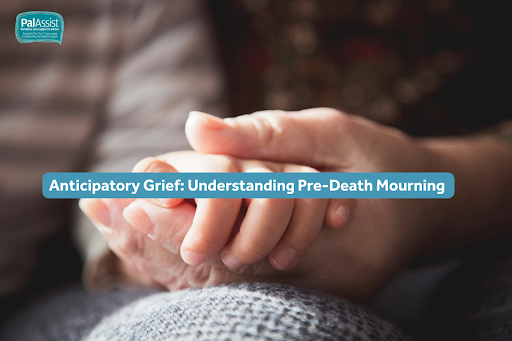Grief That Starts Before Death: Understanding Anticipatory Grief

Have you ever felt sadness about losing someone who’s still alive? If yes, then this confusing mix of emotions hits thousands of families every day, and it has a name: anticipatory grief.
We see it all the time. People feel guilty for mourning before death happens and think something’s wrong with them.
But the thing is, anticipatory grief is completely normal. And our team at PalAssist provides free support to anyone dealing with life-limiting illness, including the complex emotions that arise before loss.
In this article, we’ll walk you through:
- What anticipatory grief is and why it happens
- Emotional and physical effects on your body and mind
- Changes in your role and identity as a caregiver
- Professional support and community resources are available
- How to get help when emotions become overwhelming
Stick with us as we break down everything you need to know about this misunderstood part of grief.
What is Anticipatory Grief?
The term anticipatory grief means feeling sad before the loss occurs. According to Health Direct Australia, you may feel grief for the things you won’t get to do together with your loved one in the future.
It’s a natural emotional response that happens when facing a significant loss, and it doesn’t mean you’ve given up on the person or that you don’t care for them. This type of grief can begin months or even years before death occurs, especially when someone gets a terminal diagnosis.
Here’s what makes this experience so challenging for those who go through it:
The Emotional Toll of Grieving Before Loss
Anticipatory grief is that heavy feeling you get when you know someone is going to die soon. Most often, family members, caregivers, and even the terminally ill person themselves experience this type of mourning. They suffer because they’re watching someone they love decline while knowing the outcome is inevitable.
Common emotional tolls include:
- Overwhelming sadness and numbness
- Guilt about mourning too early
- Fear about life without them
- Anger at the unfair situation
Besides these primary emotions, many people also struggle with confusion about whether their feelings are normal. The reason this happens is that society doesn’t talk much about grief that occurs before death, leaving people feeling isolated in their experience.
If you’re going through this right now, please know that what you’re feeling makes complete sense given what you’re facing.
Anticipatory Grief vs. Conventional Grief
Unlike regular grief, anticipatory grief begins with the knowledge that a death is on the way through a terminal diagnosis or life-limiting illness. What we mean by regular grief is that mourning which starts after someone has already died. But anticipatory grief happens while your loved one is still alive, which creates a unique emotional challenge.
The whole grieving process feels different because you’re looking ahead to a life without them. Maybe your parent has terminal cancer and only months left. So you find yourself mourning family dinners that won’t happen next year, even though they’re sitting right there today.
What makes this feel so complex is that you’re experiencing loss while still having hope and spending precious time together. This dual reality creates anticipatory grief to be one of the hardest emotional experiences to handle, since the emotions can feel just as intense as post-death grief.
Dealing with the Complex Emotions of Anticipatory Grief
How does one feel when they are grieving for someone who is still alive? Well, the emotions can be overwhelming and confusing since you’re mourning while still spending time with your loved one. Your body and mind react to this stress in ways that can catch you off guard and create symptoms you might not expect.
Let’s look at how anticipatory grief affects people in both emotional and physical ways:
Psychological and Physical Effects
People who experience anticipatory grief often go through many of the same symptoms as regular grief, but with added challenges. Both your mind and body can suffer as you watch someone with a terminal illness decline day by day.
Common emotional and physical symptoms of anticipatory grief include:
- Constant anxiety and sadness
- Guilt about grieving too soon
- Trouble focusing or remembering things
- Changes in appetite or weight
- Problems sleeping
If these symptoms begin to affect your daily life, it’s a good idea to talk to your healthcare provider. Sometimes emotional support is not enough, and you may need medical care to help your body handle the stress.
The Loss of Identity and Role
Caregiver grief becomes especially intense when caring for a dying person. The anticipation of the death of a loved one often means taking on new responsibilities while losing familiar roles and routines. You might find yourself handling unfinished business or important conversations before the expected death occurs.
As this happens, the shift in roles can leave you feeling unsure of who you are outside of being a caregiver. The person you once shared activities with may no longer be able to participate, which changes the fundamental nature of your relationship.
Helpful Tip: Try to maintain some aspects of your identity beyond caregiving by setting aside time for activities that are important to you personally, like reading, walking, or calling old friends.
When grief starts before loss happens, reaching out for help early can provide you with tools and support to handle both the anticipation and the eventual reality of saying goodbye. Let’s explore what kind of support is available and how to find hope during this difficult time.
How to Find Support and Hope While Grieving
As someone dealing with anticipatory grief, you can find support in professional counselling, support groups, and trusted friends who understand what you’re going through. What helps most is reaching out before the emotions become too overwhelming to handle alone.
The reason this early support is so important is that family members often benefit from working with a mental health professional who specialises in grief counselling. These professionals understand the unique challenges of mourning someone who’s still alive and can teach you healthy ways to process these confusing emotions.
When you’re experiencing emotional distress and intense feelings about an impending death, it’s important to seek support early. Often, many people don’t realise that feelings of grief and anticipatory mourning are normal responses that deserve professional attention.
That’s why connecting with the right help early can prevent these emotions from becoming unmanageable later on. Here are some resources and steps to consider:
- Social Workers: They connect you with local resources and guide you through caregiving challenges you may face when caring for someone with a terminal condition.
- Therapy: You’ll get professional help to manage stress. If someone feels suicidal or completely overwhelmed, therapy becomes especially important.
- Support Groups (Online or In Person): Most people find comfort in knowing they’re not alone. In these groups, you can share your experiences and learn from others going through similar situations.
We once helped a daughter caring for her father with Alzheimer’s disease connect with both a grief counsellor and a local caregiver support group.
After just a few weeks, she felt less alone and had practical tools like breathing exercises and daily routines to handle her anticipatory grief.
Taking the Next Step Toward Healing
Anticipatory grief affects thousands of families, but you don’t have to face these overwhelming emotions alone. There are professional counsellors, support groups and caring communities available to make your difficult journey more bearable.
We’ve explored what anticipatory grief means, how it differs from conventional mourning, and the various ways it impacts your mental and physical health. You’ve also learned about practical support options and coping strategies that can help you through this challenging time.
When you’re ready to reach out for the guidance and compassion you deserve during this challenging time, we will be there to help you through every step.



